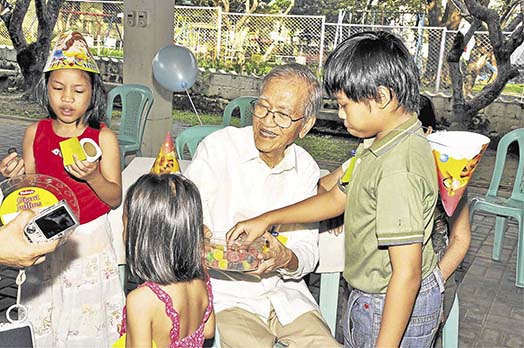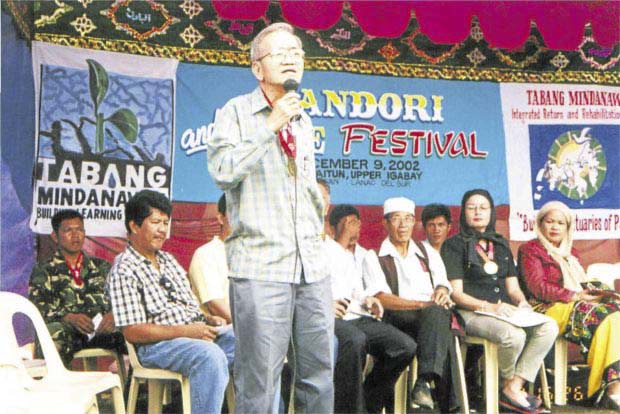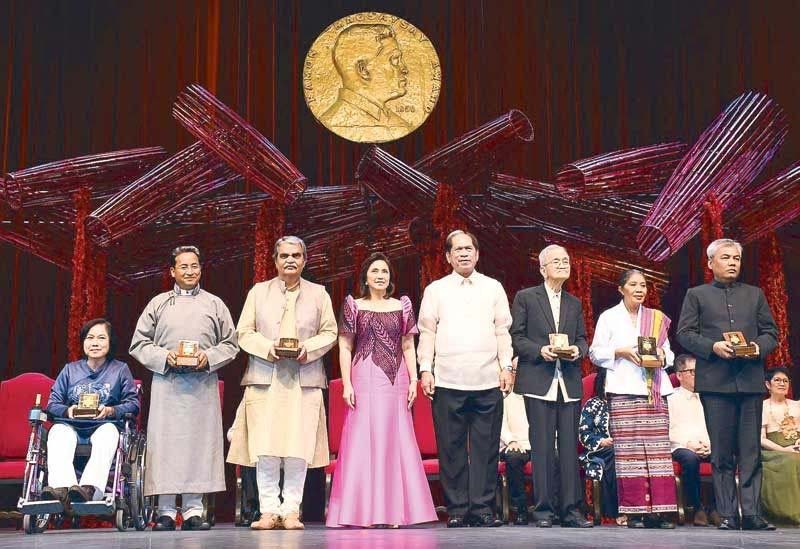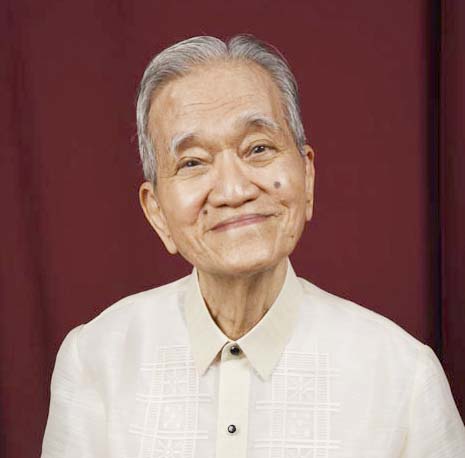For “his quietly heroic half-century of service to the Filipino people, his abiding dedication to the pursuit of social justice and peace in achieving dignity and progress for the poor, and his being, by his deeds, a true servant of his Faith and an exemplary citizen of his nation,” Ambassador Howard Q. Dee was conferred the Ramon Magsaysay Award for 2018.
In his response at the formal awarding ceremony held at the Cultural Center of the Philippines on Aug. 31, the birth anniversary of the late President Magsaysay, Dee observed that we live “in a world of turmoil and uncertainty. All human institutions are at risk, our democracy, our family, our national sovereignty.” But, he assured the audience, it is in the “darkness” that Filipinos will “see the stars of heaven.”
A man of God, Ma. Ceres Doyo, in her column in the Philippine Daily Inquirer on Aug. 30, observed that “bearing witness has been a way of life for the 87-year-old Dee, be it in the realm of his Christian faith or that of his country, family and a myriad other concerns. He talks softly but walks briskly toward a goal, especially if it involves those in the margins of society. And just as zealously, he has worked hard to address, in ways he knows how, the roots and causes of poverty and unpeace.”

Born in Tondo in 1930, Dee studied at San Beda College and, later, at the University of the East. After earning a degree in management and accounting, he took graduate studies in economics and public finance. He and his wife, Betty, have four children.
Once a captain of industry – he ran United Laboratories until he resigned in 1975 and founded, together with Fr. Francisco Araneta, SJ, the Assisi Development Foundation (ADF), dedicated to the empowerment of the poor through social development. Like St. Francis of Assisi, he divested himself of his wealth and bequeathed it to poor and indigenous communities.
The ADF was inspired by Pope Paul VI who wrote in his 1968 encyclical Populorum Progresso: “Development is the new name for peace.”
In 1998, ADF was the prime mover of the private sector initiative, Task Force Tabang Mindanaw, that assisted over 900,000 starving families during the long drought caused by El Niño.
In 2001, Dee was named special assistant to the president on the plight of indigenous peoples. In 2004, he helped establish ASA Philippines, in partnership with the Benigno S. Aquino Foundation, to offer microfinance services for the poor. He was a driving force behind the Hapag-asa Feeding Program of Pondo ng Pinoy in the Archdiocese of Manila.

By 2015, on its 40th year, ADF had executed over 4,000 projects, serving 12.5 million people in 2,500 communities with 314 partners in 78 provinces.
Though he was busy with his advocacies, Dee also engaged in government service: he served under five presidents in various peace building and development initiatives, from Corazon Aquino, to Fidel Ramos, Joseph Estrada, Gloria Macapagal Arroyo and Benigno S. Aquino III.
President Corazon Aquino drafted him as Ambassador to the Holy See and Malta in 1986. So passionate was Dee in his devotion to Our Lady of Fatima that Pope (now saint) John Paul II referred to him as “Our Lady’s Ambassador.”
After being an envoy to the Holy See, Dee joined the National Peace Conference under Cory Aquino, and then the Social Reform Council under President Ramos. He served the Arroyo administration as presidential adviser on Indigenous Peoples’ Affairs, and the Aquino administration as a member of the Bangsamoro Basic Law Peace Council.
In 1993, Ramos appointed him as chair of the government panel for the peace talks with the Communist Party of the Philippines (CPP).
Dee was thorough, patient and kind. At the negotiating table, he listened, argued and considered all sides of an issue. As chair, he skillfully managed the different points of view of his panel members and the technical team that supported them.
The talks with the Communist leaders were stressful. The issues were contentious; the other side was rude and insulting, calling him a “clerico-fascist” to his face, and belittling his qualifications and those of his panel members. But Dee persisted in his patient, prayerful way.
There were many side issues that arose in the course of the talks – the release of political detainees and continuing human rights violations, among others – but he never lost sight of the reason for the peace negotiations.
In his opening statement at the start of the first formal talks in Brussels in June 1995, Dee told the CPP panel: “Let us contend with one another, let us defend our interests to the best of our ability, but in the end, let us be willing to subordinate our position to the greater interests of the Filipino people.”
As the talks wore on, interrupted by violence and other issues, he reminded the CPP that they must pursue peace not through violence, “but by ways of peace.”
In 1999, during one of the many resumptions of the on-again, off-again peace process, he intimated to the CPP that he was close to giving up. But then he saw a picture of two NPA children who reminded him of his grandchildren – bearing arms, walking in camaraderie. And he vowed, for their sake, and for the sake of his grandchildren, not to give up pursuing peace.
But the road to peace was and continues to be rocky, often hardly navigable. In July 1999, the CPP terminated talks after the government ratified the Visiting Forces Agreement with the United States.

The 2018 Ramon Magsaysay awardees pose with Philippine Vice President Leni Robredo (fourth from left) and Senen Bacani, chair of the Board of Trustees (fifth from left), at the awarding ceremony at the Cultural Center of the Philippines in Manila on Aug. 31. They are (from left) Vo Thi Hoang Yen (from Vietnam), Sonam Wangchuk (India), Bharat Vatwani (India), Howard Q. Dee (Philippines), Maria Lourdes Martins Cruz (Timor Leste) and Youk Chhang (Cambodia). (AP Photo)
In his lecture at the Ramon Magsaysay Foundation on Sept. 27, Dee concluded that the National Democratic Front of the Philippines (NDF) inability to see non-violence as a value superior to warfare, and its refusal to shift from armed rebellion to parliamentary democracy as the causes for failure of the peace talks with the CPP.
He added that without goodwill, the negotiations became simply an extension of the battleground, and peace talks an “endless exercise in polemics.”
Now, 87 years old and ailing, Dee summed up his learnings as a peace builder and development worker in his lecture on why peace is so elusive: “I believe that peace will come only as the fruit of justice. To achieve peace, we must work for justice. To safeguard peace, we must live in justice.
“Justice, as taught in theology, is the most important of the four cardinal (principal) virtues. It moves us to render to our neighbor what is due him.
“Peace is threatened and violated when what is due to man as a human being, such as his basic right to life, to freedom, to food and clean water and just wages, is withheld or taken away.
“Justice alone, however, is not enough. Justice must be animated and transcended by love. Love is the soul of justice. Justice is the pinnacle of love. So peace is the fruit of both justice and love.
“To do justice to our fellow men and women, we need to love them. But do we love our fellow Filipinos? Do we love those who are excluded, marginalized, and live under sub-human conditions? Do we recognize the profound and equal dignity of all human persons? And do we act with urgency to reduce or eliminate excessive inequity and inequalities?
“There are 20 million Filipinos living in poverty, 4 million families who cannot provide food on the table and whose children are malnourished and go to bed hungry every night. The wealthiest 10 percent of Filipinos has more wealth than the sum total of the majority of Filipinos.
“So why is peace so elusive in our country? A short and unequivocal answer is: Because there is no justice in our land and there is no love for our fellow man. Love finds in every person, without exception – and especially in the last, the least and the lost – a neighbor, a brother, another self, and it responds justly in loving service. Loving service is the driving force of my workplace, the Assisi Development Foundation.”
His friend, Fr. Catalino Arevalo, SJ, quoting the late Fr. Francisco Araneta, SJ, wrote the following about Dee: “I believe I have never ever known anyone whose entire mind, heart and life was and is so singly devotedly – even passionately – dedicated to one purpose: to serve and love God, to fulfill His will, and His ‘doing good’ to people, especially the poor and needy in diverse aspects of life. Ambassador Howard Dee is totally a man of Christ-like faith, hope and self-giving love.”




